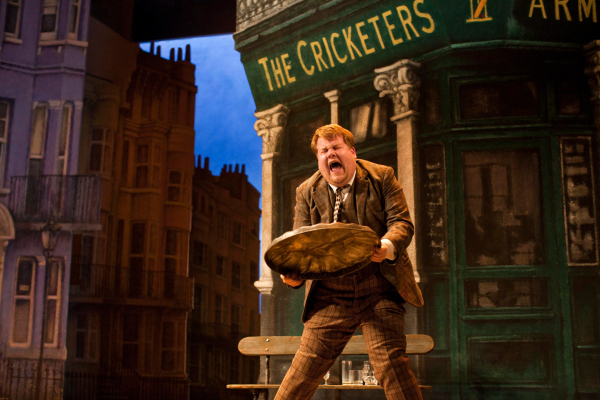Michael Coveney: Laughter is the great purgative in theatre

© Johan Persson
Donald Sinden always used to say that playing tragedy is easier than playing farce, and every funny playwright worth his or her salt knows that comedy is a very serious business. So, aside from any merits as a production, Kenneth Branagh‘s resurrection of a 1969 French farce (Le Contrat is re-titled The Painkiller in Sean Foley‘s translation) at the Garrick Theatre is of great dramaturgical interest: does farce have the capacity to address current, or even perennial, anxieties and obsessions, or must it be stuck in a historical rut of Feydeau and Ray Cooney?
The two most broadly funny and farcical plays of recent years have been Michael Frayn‘s Noises Off and Richard Bean‘s One Man, Two Guvnors. The first is largely about things going wrong in the theatre, but not just about that; The Play That Goes Wrong is not all that funny after five minutes because it is just about that. And Bean’s One Man, loosely based on Goldoni’s A Servant of Two Masters, examines the intricacies of humiliation and crossed purposes in a clearly defined, but nostalgically idealised, social milieu.
Farce is generally, and wrongly, thought to be less of a bona fide genre than civilised, literate comedy or impassioned drama.
The same was true of the joyous rediscovery of Marc Camoletti’s Boeing-Boeing a few years ago, in which Mark Rylance and Roger Allam gave impeccable and – here’s the rub – gloriously unexpected performances in a sex farce with air stewardesses. This play was once the most performed French play in the world (maybe it still is). And Matthew Warchus‘s production depended for its success on the symbiotic comic relationship of Rylance and Allam, just as Donald Sinden and Michael Williams hilariously echoed their RSC King Lear and Fool double act in Cooney’s Two Into One and, without pre-empting tomorrow’s reviews, Branagh and Rob Brydon interact in The Painkiller.
Nowadays you might want to know why farce isn’t usually the chosen territory of female playwrights, or why the discomfiture of women isn’t as funny as that of men in what used to be quaintly called the battle of the sexes. It just isn’t. But farce can deal with serious issues (excluding child abuse and genocide, probably) as Bill Morrison and Richard Bean have demonstrated in, respectively, Flying Blind and The Big Fellah, both about IRA terrorism. As Bean famously remarked, you can make jokes about anything.
The joy of farce, and its secret, lies in the mechanical deployment of a situation people would like to escape from. And herein lies its profundity, too: the identification we make with characters acting naturally in desperate circumstances; or, conversely, acting desperately in natural circumstances. And the great conspiracy between actors and audiences is that the people to whom these things are happening simply don’t know how funny they are. As the plot boils over in Two Into One, the hotel manager declares censoriously, and riotously, that "There is far too much sex going on in this hotel, and I’m not having any of it."
Laughter is the great purgative in theatre, as potent a catharsis as the climactic horrors in Greek tragedy or the multiple resolutions in Shakespeare’s comedies and romances. And yet farce is generally, and wrongly, thought to be less of a bona fide genre than civilised, literate comedy or impassioned, dogmatic drama. The same thing applies in musical theatre, where opera snobs will turn up their noses at Andrew Lloyd Webber and Les Miserables while booking tickets for Puccini and Philip Glass at the opera houses.
The fallacy of these distinctions was once wryly exposed by Alan Bennett at an awards ceremony when Alan Ayckbourn won the best play gong and Bennett the best comedy. He said that, while Ayckbourn may well have written the better play, he at least could console himself with having written the funnier one. And, given the choice, which would you prefer?
In Branagh’s wonderful ongoing season at the Garrick, we have enjoyed a superlative production of a masterpiece, The Winter’s Tale. But you’ll probably laugh a whole lot more at The Painkiller and, when you sit down later and think about it, you may not want to trade one experience for the other, or even consider that Branagh has sullied his reputation as a Shakespearean by exiting the comfort zone he patrolled as a superb Leontes to inhabit the more unexpected and challenging one of a bovine assassin in The Painkiller.










